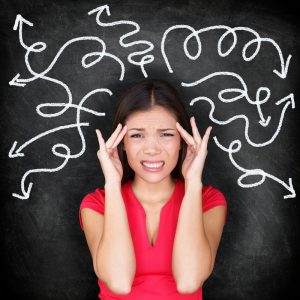Children with ADHD can be a lot to handle. They are constantly distracted and on the move and can get into things if not properly monitored. Parents can become quickly frustrated with these antics and lose their cool. Parents can add fuel to the fire by responding improperly to ADHD behavior. It is important to understand how to respond to children with ADHD as to better control the behavior and help the child cope.

The article, “2 Things It’s Best Not to Say to Children With ADHD” by Anthony Smith takes a closer look at how to properly manage a child with ADHD. He warns against fueling ADHD behavior and making it worst by avoiding certain actions and behaviors. In particular, he lists the comments “Will You Behave” and “Can you stop and just focus” as two phrases to avoid. He states,
“People who encounter kids with ADHD are frequently guilty of two phrases that ultimately add to their frustration and contribute to a negative self-perception and possibly conduct issues. If you know someone with ADHD, or you encounter such individuals on the job and aren’t sure what to say, avoiding the following two phrases will likely up your game, especially if replaced with the suggested alternatives.”
“2 Things It’s Best Not to Say to Children With ADHD”. Anthony Smith. December 30th, 2022. Psychology Today.
To learn more how to help manage children with ADHD, please read the entire article and click here
Commentary
Raising a child with Attention Deficit Hyperactivity Disorder (ADHD) can be a challenge, but with the right knowledge and tools, parents can successfully manage their child’s condition and help them reach their full potential. ADHD Consultants can help supply guidance and information in meeting these challenges. Counselors with specialty certifications in ADHD can also work with a child.
As a parent of a child with ADHD, you may experience a range of emotions, including frustration, guilt, and helplessness. It’s important to remember that you’re not alone in this journey. With the right strategies and support, you can help your child thrive.
ADHD is a neurodevelopmental disorder that impairs a person’s ability to focus and self-regulate. It’s estimated that up to 11 percent of children between the ages of 4 and 17 have been diagnosed with ADHD, making it one of the most common mental health disorders in children. While there is no single cause of ADHD, research suggests that genetics, environmental factors, and brain development may all play a role.
Identifying ADHD in Your Child
It’s important to identify ADHD early, as early intervention can be key in managing the disorder. Symptoms of ADHD vary and can range from difficulty paying attention to impulsivity and hyperactivity. Some children may be more hyperactive or impulsive, while others may have difficulty staying focused or organized.
If your child is exhibiting any of the following symptoms, they may have ADHD:
- Difficulty paying attention or staying focused
- Easily distracted
- Impulsivity
- Difficulty following instructions
- Hyperactivity
- Poor organizational skills
If you think your child may have ADHD, it’s important to speak with your pediatrician. They can provide a thorough medical evaluation and refer you to a mental health professional for further testing and diagnosis.
Understanding ADHD and Learning how to Parent a Child with it
Once your child is diagnosed with ADHD, it’s important to learn as much as you can about the disorder. Understanding the signs, symptoms, and treatments of ADHD can help you better manage your child’s condition and provide them with the resources they need.
The key to successful parenting of a child with ADHD is to create a positive and structured environment. This means setting clear expectations, creating routines and schedules, and providing positive reinforcement when your child meets those expectations. Additionally, it’s important to be aware of your own emotions and reactions, as your attitude and behavior can have a significant impact on your child’s mental health.
Tips for Parenting a Child with ADHD
Here are some tips for parenting a child with ADHD:
- Establish clear rules and expectations. Set boundaries and be consistent with them.
- Praise your child when they do something positive. Positive reinforcement can be a powerful tool for motivating good behavior.
- Break tasks down into smaller, manageable steps. This can help your child stay focused and on task.
- Set aside time for one-on-one activities that your child enjoys. This can help build your child’s self-esteem and allow them to practice self-regulation.
- Limit distractions in the home. Turn off the TV and limit screen time.
- Get organized. Create a designated space for your child’s schoolwork, toys, and other items.
- Be patient. Parenting a child with ADHD can be challenging, but it’s important to remain patient and consistent.
Setting Limits and Creating Structure
Setting limits and creating structure is key to parenting a child with ADHD. Clear expectations and boundaries can help your child stay focused and on task. It’s also important to be consistent with these limits, as consistency can help your child develop a sense of security and predictability.
Create a routine and stick to it. Routines can help your child stay organized and on track. Have your child take part in creating the routine, as this can help them take ownership of their responsibilities. Additionally, provide rewards and consequences for good and bad behavior. Rewards can be used to motivate good behavior, while consequences should be used sparingly and only when necessary.
Developing Routines and Schedules
Having a daily routine and schedule can be helpful for a child with ADHD. Routines provide structure and can help your child stay focused and on task. Additionally, they can help your child develop time management skills, which can be invaluable both in school and in life.
When creating a routine or schedule, involve your child in the process. This can help them take ownership of their responsibilities and give them a sense of control. Additionally, it’s important to be flexible and understand that it may take some time for your child to adjust to the new routine.
Building Self-Esteem and Self-Confidence
Self-esteem and self-confidence can be a challenge for children with ADHD. It’s important to provide your child with positive reinforcement and praise when they do something positive. Additionally, try to focus on your child’s strengths and encourage them to pursue activities that they enjoy. This can help boost their self-esteem and give them a sense of accomplishment.
It’s also important to be aware of your own reactions and emotions. Children with ADHD can often feel overwhelmed by their own emotions and overwhelmed by the expectations of others. If your child is struggling, it’s important to provide them with a safe space to express their feelings and provide them with comfort and reassurance.
Understanding and Responding to Challenging Behaviors
Children with ADHD often exhibit challenging behaviors, such as impulsivity, hyperactivity, and difficulty following instructions. It’s important to be patient and understanding when confronting challenging behaviors. Talk to your child and try to understand the root cause of their behavior. Additionally, it’s important to remain consistent and provide clear expectations and consequences.
It’s also important to provide your child with positive reinforcement for good behavior. Praise them when they do something positive and reward them for meeting expectations. This can help motivate good behavior and boost their self-esteem.
How to Communicate With Your Child About ADHD
Communication is key when it comes to parenting a child with ADHD. It’s important to create an open and honest dialogue with your child about their condition. Explain their diagnosis in age-appropriate terms and help them understand their feelings and behaviors. Additionally, it’s important to be understanding and reassuring when your child is struggling.
It’s also important to provide your child with accurate information about ADHD and its treatments. This can help your child better understand their condition and feel more empowered to manage their symptoms.
Dealing with Stress and Anxiety
Parenting a child with ADHD can be stressful and overwhelming. It’s important to take time for yourself and practice self-care. Make time for activities that you enjoy and find ways to reduce stress, such as exercising or meditating. Additionally, it’s important to seek out support from family and friends.
If stress becomes too overwhelming, it’s important to speak with a mental health professional. They can provide you with the support and resources you need to better manage your stress and emotions.
Professional Resources for Parents of Children with ADHD
There are a number of resources available for parents of children with ADHD. Organizations such as CHADD (Children and Adults with Attention Deficit/Hyperactivity Disorder) and the National Resource Center on ADHD provide information and support for parents. Additionally, there are a number of online resources, such as forums and support groups, that can provide you with additional information and resources. ADHD Consultants can also supply a wealth of knowledge about managing and helping a child cope with ADHD.
Conclusion

Raising a child with ADHD can be challenging, but with the right knowledge and tools, parents can successfully manage their child’s condition and help them reach their full potential. By understanding ADHD and learning how to parent a child with it, parents can create a positive and structured environment and provide their child with the resources they need to succeed.
If you’re a parent of a child with ADHD, remember that you’re not alone in this journey. Seek out support, be patient, and remember to take care of yourself. With the right strategies and support, you can help your child thrive.
If on the other side, you wish to help others with ADHD, many counseling professionals seek an ADHD Consulting Certification. Please also review AIHCP’s ADHD Consulting Certification and see if it meets your professional and academic goals. AIHCP offers a four year certification in ADHD Consulting. The program is online and independent study and open to qualified professionals.
Additional Resources
“Parenting Tips for ADHD: Do’s and Don’ts”. Eloise Porter. September 17th, 2018. Healthline. Access here
“How to Retool Your Parenting Skills When Raising a Child With ADHD”. Melissa Daly. May 9th, 2022. WebMD. Access here
“Parenting a child, teen with ADHD”. Janice Schreier. September 13th, 2022. Mayo Clinic. Access here
“When Parent and Child Both Have ADHD”. Caroline Miller. April 12th, 2022. Child Mind Institute. Access here










